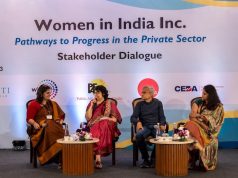Nothing can prepare someone for parenthood. You need to experience it to know it. The unpredictability of a pea-sized human being, coupled with crazy hormones makes a perfect recipe for self-doubt. You suddenly start questioning yourself at every step. Handling budgets that ran into crores, doling out successful campaigns in impossible timelines, negotiating your way through tough discussions – all of these suddenly seems minuscule compared to handling a tiny little person.
There are multiple implications of this phase at the professional side of things as well.
The Maternity Bill passed by the Parliament in March 2017 extended maternity leave for women from 12 weeks to 26 weeks in India. The decision was definitely a huge step but at the same time, it implied that parenthood responsibility is naturally skewed towards women.
There is nothing about woman that makes her a better nurturer as per science. It was a convenient evolution given the context of the society once upon a time. Since today neither do men go hunting nor are women required to protect their kids from poisonous plants and dangerous wild animals, it is only fair to seriously give a thought to Paternity Leaves.
A blog on paternity leaves in India (blog.ipleaders.in) states the main provisions of the paternity bill as below:
1. Men in both the formal and informal sector, a natural father or adoptive father, at the average daily wage payable to him on days which he has worked or the minimum rate of wage fixed should be entitled to paternity leave of up to 15 days, which can be availed in the first three months of the newborn’s birth. The amount under paternity benefit for the period preceding the date of expected delivery of child to man, will be paid in advance.
2. Setting up a Parental Benefit Scheme Fund in which all employees (irrespective of gender), employers, and Central Government would make a defined contribution to finance the paternity leave.
3. The Bill mandates that men be permitted up to four visits per day to crèche facilities created in proximity to their workplace.
The last point was a huge surprise for me. In a society where men still use the crutch of Sick Leaves to attend parents’ teachers’ meeting, it definitely is a strong endorser of a responsible parent behaviour who prioritises family commitments alongside his work deliverables.
Unfortunately, the paternity bill is legally applicable only for all the public sector companies of the Central Government. The employer can take the final call in case of private sectors. Of-course some MNC’s (Ikea, Novartis) have gone far and beyond by extending the Paternity Leave to 6 months and hence signalling the society that once the baby is delivered, both the parents can and should do everything pertaining to childcare as needed. Of course, the actual delivery and breastfeeding cannot be handled by the father but everything else can definitely be.
I came across Pallavi Mahajan’s paper on “FATHERS, PATERNITY BENEFITS AND GENDER NORMS” through LinkedIn where she argues that there is a need to have extensive consultations with representatives of formal and informal enterprises, employee unions, as well as women‘s groups to actually understand how a sophisticated, forward-looking legislation can be developed to support families with child-care. I feel this is a holistic way of designing the policies that impact our future generations.
A good starting point would obviously be to roll out a neutral Parental (neither maternal nor paternal) Leave policy. Preferring long-term benefits over short-term costs is a trait of a truly evolved and robust society.
An equal or shareable paternity leave for the partners will also counter the biases at recruitment level that looks at newly-wed women very differently from men. It might be a subconscious bias but it is definitely palpable.
Once the baby is born the society defined gender roles try to influence who amongst the parents takes the break for being around the child during the “crucial period”. Definition of the crucial period differs in every parents’ book – the first 3-4 years, teenage years, board exams – but what remains pretty much standard (at least in India) is which parent takes the break in her/his career to give complete attention to the child during the identified critical phase. While the most logical way to decide who should take this break is to consider the implications on the household income of this break and/or the career phase that the particular parent is in, unfortunately, the stereotypical natural nurturer image of the mother and the stigma against a man opting to look after his household duties over his breadwinning duties, bullies the outcome of this decision. Gender-neutral implies as much freedom for the males to opt-out or pursue professional excellence as their female counterparts enjoy but society would rather have the men participating in the rat race of workplace.
The recent article in Forbes called “Gender Mender” stated that in India, women spent 312 minutes per day in urban areas and 291 minutes per day in rural areas on unpaid care work in 2018, according to ILO data. The corresponding number for men was: 29 minutes (urban) and 32 minutes (rural). Another set of data by Organisation for Economic Co-operation and Development (OECD) exposes another abominable reality: Indian women spend up to 352 minutes per day on domestic work, which is 577 per cent more than the country’s men (52 minutes). It would be interesting to see how this data changes for working couples.
Thankfully the era of cameo appearances by fathers for bringing up the kid, which was/is true even in double-income households, is slowly diminishing. In the same article of Forbes some of the working couples, married for more than 10 years, mentioned that the pandemic has triggered a behavioural change towards household chores in male counterparts. The question is why do we need a pandemic to register something as simple as the fact that teamwork produces healthier results even at home while we very naturally believe in it without any resistance at workplaces?
We are influencing the generation that will shape the future of our world and they learn more from what they see than what is being preached to them. A partnership approach to parenting is one such tool to impart a valuable lesson to our kids in gender neutrality. Otherwise, the generation waiting to take over from us will again waste a lot of time unlearning the biases that we will unknowingly imbibe in them.
And while we are at it, let us judiciously re-calibrate our expectations from our children as well. Whether boy or girl, they have only 24hrs in a day at their disposal. Thus it is high time that all of the past “basic” expectations from a particular gender vanishes. Boys need not grow up to be the strong chief wage earners and women need not be the ideal homemaker before they stretch themselves to other roles.
If we play our part right in the partnership of parenting, I believe we will be rewarded with a future inhabited by responsible human beings who are not born with any pre-assigned roles but are free to choose and cherish their own roles.
Views of the author are personal and do not necessarily represent the website’s views.
 Sanchita Ganguly is a marketing professional with experience across agencies and multiple leader brands. Her decade and a half long professional journey inspired her to author her debut book “We-Men@Work” that intends to trigger conversations around gender neutrality at workplaces.
Sanchita Ganguly is a marketing professional with experience across agencies and multiple leader brands. Her decade and a half long professional journey inspired her to author her debut book “We-Men@Work” that intends to trigger conversations around gender neutrality at workplaces.
To read more stories by the author, click here.
Thank you for reading the column. Please drop a line and help us do better.
Regards,
The CSR Journal Team












